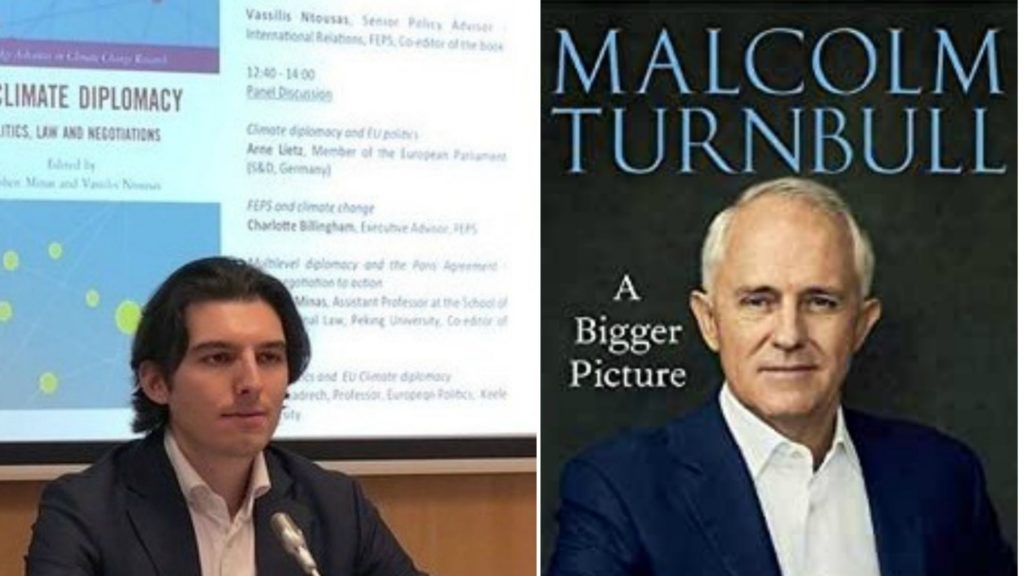Malcolm Turnbull’s autobiography was never likely to pass without incident, even in these disrupted times. As it happened, the official launch was pre-empted by pirated e-copies circulating in government offices while bookshops and publishers are doing it tough. Then there was the low-grade vaudeville of an ex-Family First candidate calling for Mr Turnbull’s expulsion from the Liberal Party, confirming that history does repeat as farce.
The book is a marvellous read, whether you agree with the author’s assessments or not. There is a lot of Sydney history in the early chapters, which as an uninformed Melburnian, I found interesting. These are followed by lively retellings of Mr Turnbull’s engagements with colourful business identities, celebrated trials and less-celebrated royal commissions.
Most of the book is devoted to the three years of the Turnbull government. A key theme is crafting a positive economic programme. The National Innovation and Science Agenda was the starting point. These measures to build Australia’s innovation ecosystem responded to unfulfilled potential, including the lowest rate of industry-research collaboration in the OECD. Mr Turnbull is proud of the ‘series of firsts’ launched through this agenda and of major increases in start-up and venture capital investment.
The material on social policy provides insights into challenges like schools funding and entrenched Indigenous disadvantage. Marriage equality stands out as a major progressive reform, delivered despite implacable opposition from the usual suspects. Mr Turnbull celebrates the ‘overwhelming vote of confidence’ delivered by Australians endorsing equality. Mr Turnbull’s support of multiculturalism shines through in the book, from youthful admiration of Norman Sicily’s ‘convivencia’ to vocal support for immigration and multicultural communities in government.
On refugees, Mr Turnbull never joined the opposition to the ‘Pacific Solution’ of offshore detention introduced by John Howard and restarted by Kevin Rudd. While defending the policy of denying boat arrivals entry into Australia, Mr Turnbull states that third-country resettlement of Manus and Nauru detainees was among his ‘highest priorities’. His deal with the Obama administration for the United States to take an unspecified number of detainees was successfully defended in the notorious call with President Trump. Nevertheless, the ‘bigger picture’ here is that offshore processing with all its harmful consequences looks set to continue indefinitely, with the apparent approval or indifference of most Australians.
READ MORE: Stephen Minas and his move from Victorian politics to the United Nations
On foreign affairs, Mr Turnbull argues that ‘we need to look to our own defences both in military terms and, above all, in building closer ties across our region’. The work done to salvage the Trans-Pacific Partnership after US withdrawal will be an enduring contribution to these closer ties. Mr Turnbull also details how he invested in his relationship with Indonesian president Joko Widodo, and claims that ‘Indonesia-Australia relations reached their closest level of understanding and cooperation’ under his government. On China, Mr Turnbull argues that his government took a responsible and balanced approach. He concludes that ‘the key to a healthy relationship between China and Australia is respect’.
The book culminates in climate policy and the coup. The travails of Australian climate policy since the emissions trading scheme debacle are well-known, but Mr Turnbull also details serious energy market problems he inherited as prime minister. Mr Turnbull credits Snowy 2.0 as his ‘single most important and enduring’ energy decision. The National Energy Guarantee (NEG) would have been a broader intervention, addressing the energy ‘trifecta’ of reliability, affordability and emission reductions to meet Australia’s Paris Agreement commitments.
The August 2018 coup seized on right-wing opposition to legislating the NEG’s emission reductions component. Mr Turnbull writes that his ‘initial instinct was to introduce the bill and stare the wreckers down’, but that he acceded to the overwhelming Cabinet view that the bill be put off until it could pass without Opposition support. This impasse was used to trigger the push to make Peter Dutton prime minister, a collective brain fade best explained by the Streaker’s Defence. Mr Dutton had boycotted the Apology to the Stolen Generations and ridiculed small island nations facing sea-level rise. The petition hawked around parliamentary offices by Mr Dutton’s ‘numbers men’ (such as they were) was labelled a ‘suicide note’ by one Liberal MP at the time. Mr Turnbull offers a detailed account of his government’s termination from within.
Could Mr Turnbull have held on as prime minister? Misjudgements in the midst of a party coup are all but inevitable. There’s not much use to a ‘rational actor model’ when large numbers of colleagues, variously animated by ambition, spite or stupidity, are acting irrationally. Herd mentality takes over. In Australia it is called a ‘spill’ but the Irish term, the ‘heave’, better captures these attempts to stampede an incumbent from office. The frequent party coups of the last decade were an affront to democracy. They damaged the quality of governance and policy development.
Overall, Mr Turnbull depicts his government as a work in progress, ‘rudely interrupted’. Despite all the compromises and constant internal sabotage, it was in many respects the ‘thoroughly liberal government’ Mr Turnbull promised. Mr Turnbull writes that his greatest regret was ‘our failure, the world’s failure, to effectively address global warming’, but argues that ‘I gave it my best shot’. He rightly observes that ‘we no longer have to wear an economic hair shirt to save the planet. Abundant, cheap, zero-emission electricity is within our grasp’. The resilience of renewable energy supply during the current pandemic, as detailed by the International Energy Agency, bolsters this conclusion. What Australia’s Chief Scientist calls the ‘orderly transition to the electric planet’ is in prospect.
Dr Stephen Minas was previously a staffer for Liberal members of the federal and Victorian parliaments.
